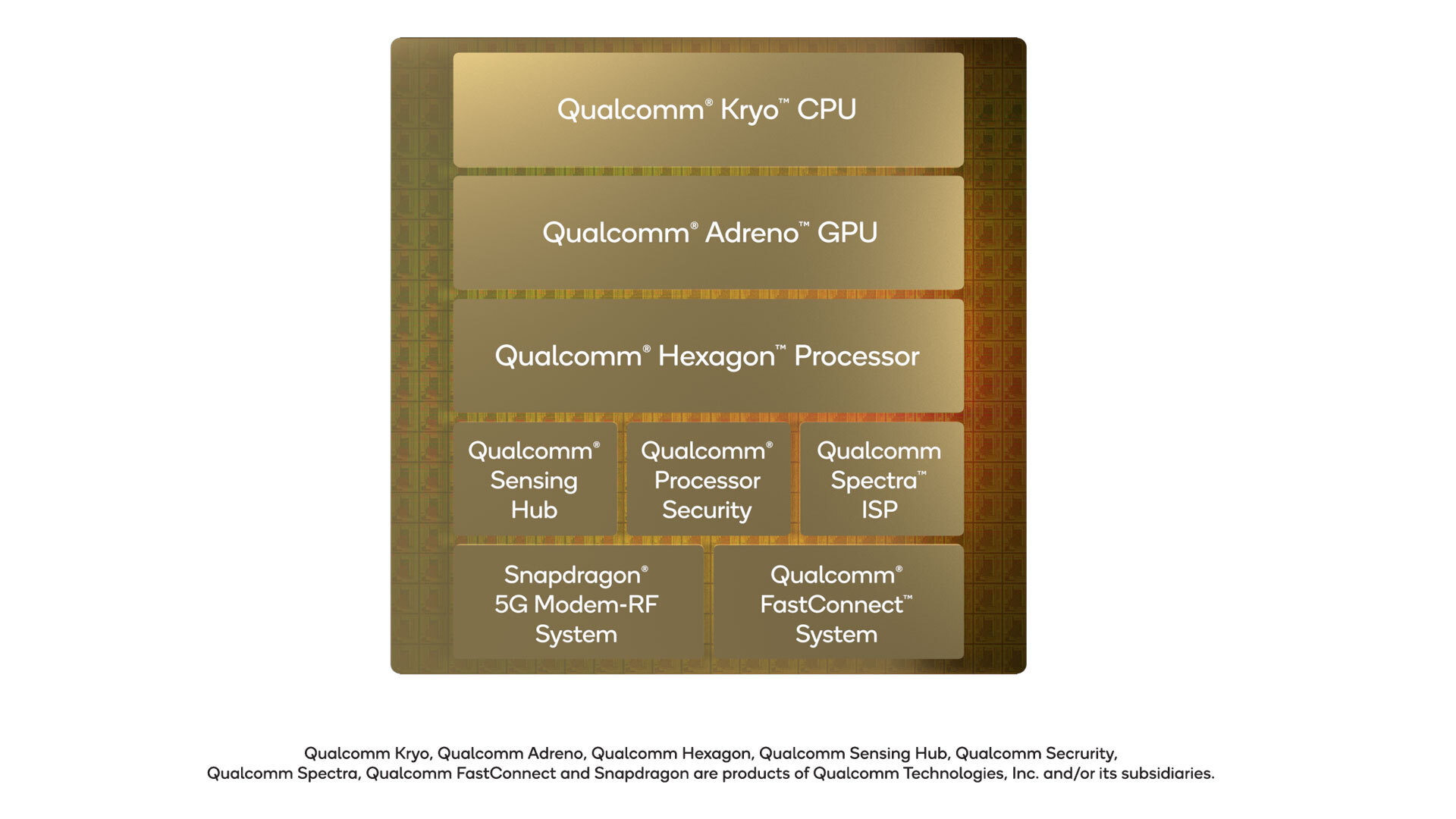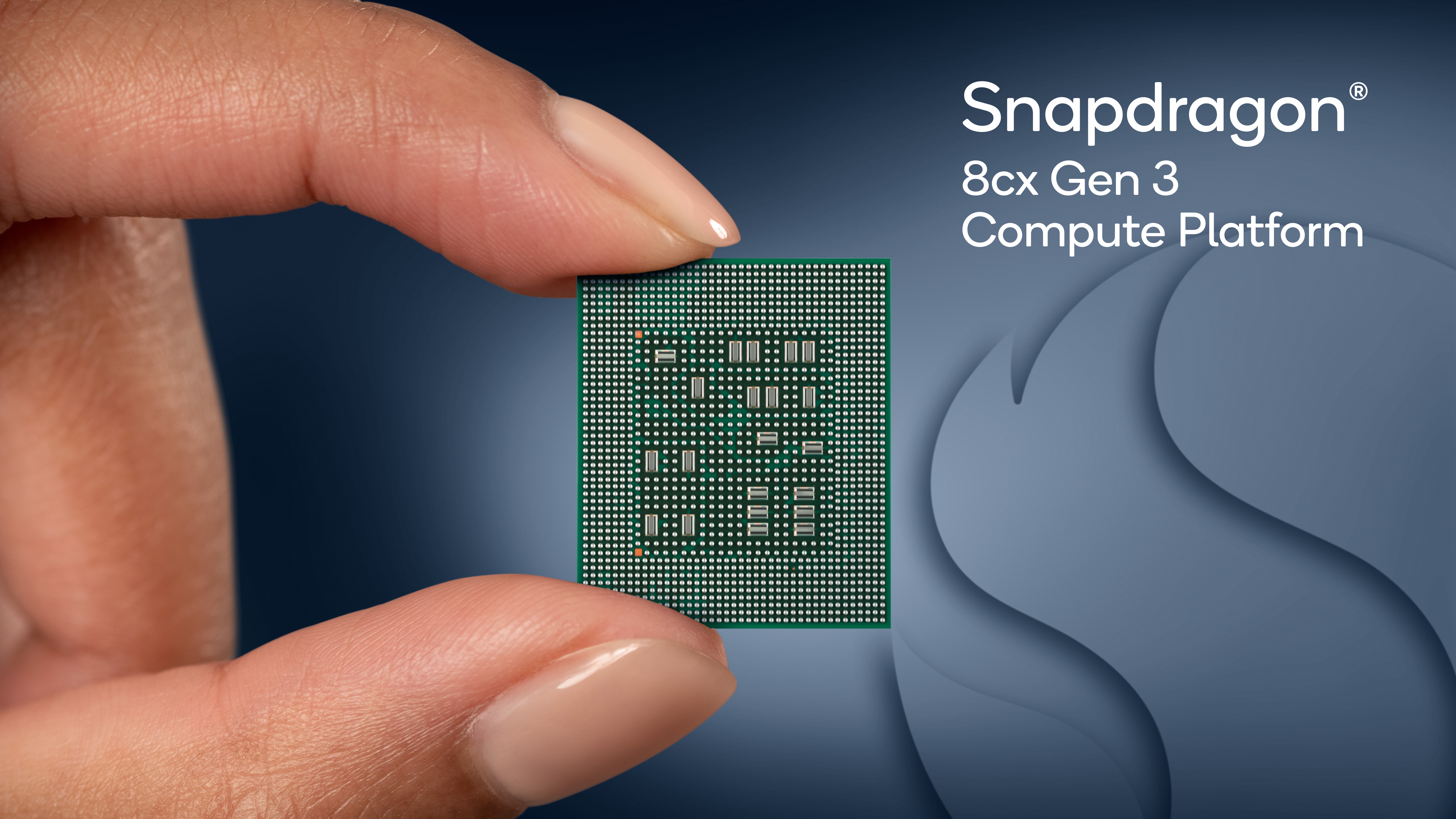Qualcomm's First 5nm PC Chip, 8cx Gen 3, Is Coming Next Year
Qualcomm is taking its next stab at the PC space with two new SoCs. At its annual Snapdragon Tech Summit in Hawaii, the company announced its flagship Snapdragon 8cx Gen 3 for PCs and budget-oriented Snapdragon 7c+ Gen 3 for laptops and Chromebooks.
The Snapdragon 8cx Gen 3 is based on a 5 nm process (the first in a PC, Qualcomm claims), with a Qualcomm Kryo CPU and Adreno GPU. Qualcomm hasn't listed specific core counts or clock speeds as of this writing, but the company says that the 8cx Gen 3 offers an 85% CPU performance improvement over the 8cx Gen 2 and 60% faster GPU performance, Additionally, it claims 60% better performance per watt over "the competitive x86 platform," as measured running Geekbench 5.
| Header Cell - Column 0 | Snapdragon 8cx Gen 3 | Snapdragon 7c+ Gen 3 |
|---|---|---|
| CPU | Qualcomm Kryo CPU | Qualcomm Kryo octa-core CPU |
| GPU | Qualcomm Adreno GPU | Qualcomm Adreno GPU |
| Memory | 8 x16 channel LPDDR4x-4266 | 2-channel LPDDR4x4-266, LPDDR5-6400 |
| Storage | NVMe over PCIe, UFS 3.1 | PCIe NVMe SSD, eMMC 5.1, SD 3.0, UFS 2.1 |
| Display Support | 4K UHD on device, two 4K displays external | FHD+ on device |
| Connectivity | Wi-Fi 6E, Bluetooth 5.1 | Up to Wi-Fi 6E, Bluetooth 5.2 |
| 5G Modem Support | Snapdragon X65, Snapdragon X55. Snapdragon X62 | Snapdragon X53 |
| Camera | Qualcomm Spectra ISP, up to 24 megapixels | Qualcomm Spectra ISP |
Like previous PC chips, Qualcomm is continuing to tout the idea of an "always on, always connected" PC, with support for 5G, 4G LTE, and Wi-Fi 6/6E. 5G modem support tops out with the Snapdragon X65, with 10 Gbps peak download speed and support for both sub-6 and mmWave technologies.
The on-board Qualcomm AI engine allows the 8cx Gen 3 to deliver over 29 TOPS (tera operations per second, measured in trillions), which is three times greater than the Gen 2. Qualcomm also continues to suggest its chips enable multi-day battery life (at least 25 hours) on a single charge.
In a press release, Qualcomm claimed that the GPU allows for gaming at full HD (1080p) up to 120 fps, "and is optimized to allow users to game up to 50% longer than certain competing platforms." The company didn't specify which platforms it was trash talking, but that test is based on using the game Big Rumble Boxing on Qualcomm reference platforms and commercially available machines.
For video conferencing, the 8cx Gen 3 utilizes a Qualcomm Spectra image signal processor with camera startup that is 15% faster than the previous chip. It has enhanced autofocus, auto white balance and auto exposure, and works with up to 5K HDR cameras (and up to four cameras in total).
The 8cx Gen 3 also implements Microsoft Pluton TPM on the Qualcomm secure processing unit (SPU). There's also a camera-based security feature that uses a computer vision processor to make sure that Windows Hello cameras lock the screen when authorized users step away from their notebooks.
Get Tom's Hardware's best news and in-depth reviews, straight to your inbox.
The Snapdragon 7c+ Gen 3 is meant for entry-level Windows PCs and Chromebooks. Unlike the 8cx Gen 3, it's built on a 6 nm process. The company claims it offers up to 30% stronger CPU performance than competitive chips, but didn't name those competitors. In terms of AI, it offers 6.5 TOPS of performance.
Qualcomm's lower-end chip also has 5G support, albeit with a single modem option, the Snapdragon X53 with a peak download speed of 3.7 Gbps. This platform, too, supports both mmWave and sub-6 s GHz support.
Both chips follow Qualcomm's new naming scheme for both its mobile and PC processors, which ditch the company name entirely to focus on the "Snapdragon" sub-brand. Qualcomm is currently fighting an intense battle in the Arm space, with Apple proving to be a powerful competitor with its M1 chips offering strong performance and long battery life in fanless designs like the MacBook Air.
Qualcomm hasn't announced any devices powered by these new chips, but claims that they will begin to launch in the first half of 2022. Perhaps we’ll see some at CES in Las Vegas in January.

Andrew E. Freedman is a senior editor at Tom's Hardware focusing on laptops, desktops and gaming. He also keeps up with the latest news. A lover of all things gaming and tech, his previous work has shown up in Tom's Guide, Laptop Mag, Kotaku, PCMag and Complex, among others. Follow him on Threads @FreedmanAE and BlueSky @andrewfreedman.net. You can send him tips on Signal: andrewfreedman.01
-
Alvar "Miles" Udell If they can match the Apple M1 Macbook Air's battery life of 16 hours of video playback, graphic below from TechCrunch as TH didn't do a video playback test, just a web browsing test, and if these laptops are priced sub $350 (preferably sub $300) and run unrestricted Windows 11, they'd really put a hurting on Chromebooks. Aside from being able to run the proper Office 365 suite, there's people like me who would love a laptop to use for messengers and such while I'm playing a full screen game as well as a portable, inexpensive laptop to use while I'm traveling. I already have my eye on the Samsung Galaxy Book Go which uses a 2.5 GHz Qualcomm Snapdragon 7c Gen 2, but this new chip would blow it out of the water...Reply
Why couldn't we have had these things back when I was in college in the noughties...Having to have 3 batteries to switch between to last all day was expensive, and a pain... -
gggplaya Technically "PC" stands for personal computer and Apple's M1 is also 5nm and out before this Qualcomm chip. So i'm not sure how Qualcomm can make that claim.Reply -
Alvar "Miles" Udell Replygggplaya said:Technically "PC" stands for personal computer and Apple's M1 is also 5nm and out before this Qualcomm chip. So i'm not sure how Qualcomm can make that claim.
Is a Mac a PC? (computerhope.com)
"However, when IBM introduced their first computer in August 1981, model number 5150, the term PC became something more specific. From that point on, the PC became a reference to IBM-compatible computers. Today, when PC is used to talk about a computer, it usually is referring to an IBM-compatible computer. By this definition, a Mac computer is not a PC, as it is not IBM-compatible. " -
jakjawagon ReplyAlvar Miles Udell said:Is a Mac a PC? (computerhope.com)
"However, when IBM introduced their first computer in August 1981, model number 5150, the term PC became something more specific. From that point on, the PC became a reference to IBM-compatible computers. Today, when PC is used to talk about a computer, it usually is referring to an IBM-compatible computer. By this definition, a Mac computer is not a PC, as it is not IBM-compatible. "
I disagree. Prescriptively, the term 'personal computer' predates the IBM PC. Descriptively, very few people talking about PCs these days know or care about the IBM PC.
If a PC strictly has to be IBM-compatible, then modern computers aren't even PCs. Software that ran on the IBM PC absolutely will not run on a modern computer without some sort of emulation.

